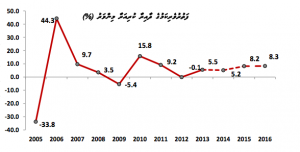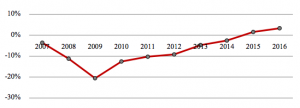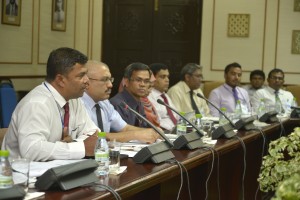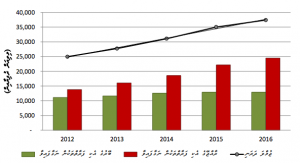Parliament today passed three bills submitted by the government to raise additional revenue anticipated in the 2014 state budget.
The revenue raising measures approved today include hiking the Tourism Goods and Services Tax (T-GST) from eight to 12 percent in November, reintroducing the discontinued US$8 bed tax starting this month, and requiring resort lease extension payments to be made within two years.
While the two amendments to the Tourism Act were voted through 38-18, the amendment to the Goods and Services Tax Act was approved 39-18. The changes will take effect once signed into law by the president.
The passage of the amendment bills was greeted with applause from government-aligned MPs.
MPs of the opposition Maldivian Democratic Party (MDP) voted against all three pieces of government-sponsored legislation, contending that the tax hikes would adversely affect the tourism industry.
“Numbers will not match”
The government had initially proposed collecting resort lease extension fees within three months, collecting bed tax throughout this year, and raising T-GST in July.
However, the parliamentary subcommittee that reviewed the legislation consulted the Maldives Association of Tourism Industry (MATI) last week and recommended revising the government’s proposals.
Representatives from MATI opposed continuation of the bed tax alongside the T-GST increase.
Appearing before the subcommittee, MATI Secretary General Ahmed Nazeer also questioned the practicality of collecting resort lease extension fees upfront.
Only 17 out of more than 100 resorts offered the opportunity by the administration of former President Mohamed Nasheed to extend leases with a lump sum payment were able to do so, Nazeer said.
Resort owners had amended their lease agreements to pay extension fees in installments during Dr Mohamed Waheed Hassan’s administration, Nazeer noted, and revising agreements for a third time could present legal challenges.
Government-aligned Jumhooree Party Leader Gasim Ibrahim – who chaired the subcommittee – meanwhile told local media following the revisions that the bed tax and T-GST hike would overlap in November, after which the former would be discontinued.
The decision was made to compensate for the loss of income from the bed tax in January, the business magnate and resort owner explained.
Finance Minister Abdulla Jihad told local media last month that the Majlis’s failure to extend the bed tax would result in a revenue shortfall of MVR100 million (US$6 million) a month.
Moreover, in the wake of the subcommittee’s revisions, Jihad warned that the projected MVR 3.4 billion (US$224 million) in additional revenue – which accounts for 18 percent of the record MVR17.95 billion budget passed for this year – could not be realised in full due to the changes.
Following remarks by Progressive Party of Maldives MP Moosa Zameer at the subcommittee last week – suggesting that pro-government MPs supported abolishing the bed tax in favour of increasing T-GST – Jihad told Minivan News that the government’s stance had not changed.
“It has not changed. And if the government does not go on with the bed tax, the numbers will not match in the budget,” he said.
Meanwhile, parliament yesterday accepted for review amendments submitted by the government to revise import duties.
In addition to raising tourism taxes and custom duties, other revenue raising measures proposed by the government include raising airport departure charge for foreign passengers from US$18 to US$25, leasing 12 islands for resort development, and introducing GST for telecommunication services.
 (0)Dislikes
(0)Dislikes (0)
(0)


